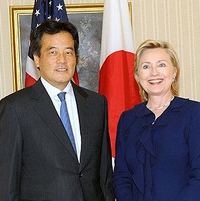Serious. It's a word you'll hear the Japanese use again and again to describe Foreign Minister Katsuya Okada, and it's one that just as accurately describes the foreign policy challenges Japan faces.
It is just a few months since the Democratic Party of Japan seized power after more than five decades of virtually uninterrupted Liberal Democratic Party control. Yet, Okada, 56, has already been forced to confront what some are calling a crisis in the U.S.-Japan relationship, follow through on the party's pledge to withdraw from a highly symbolic but contentious refueling mission for U.S.-led forces in Afghanistan, and warn an increasingly confident China that Japan will "take action" against it should Beijing follow through with plans to drill in disputed waters.
"Okada made a good start," says Toshiyuki Shikata, a former Self-Defense Forces general and now defense analyst and law professor at Teikyo University. "He's a very serious man. He works very hard . . . and he's decisive and speaks out. That's very important."

